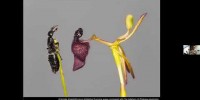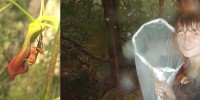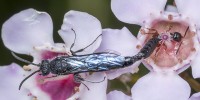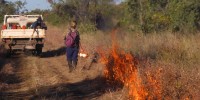Peakall Group - Pollination, evolution and conservation
Research in the Peakall Group is focused on the development and application of DNA based genetic markers for investigating a range of pure and applied questions in evolutionary and conservation biology. The integration of ecological, population genetic and molecular tools allows novel insights that are not possible on their own.
Our study organisms include plants, mammals, birds, insects and fungi. Studies of orchids feature strongly, but by no means exclusively, in greater part because their novel pollination systems are ideal for exploring a range of evolutionary questions. Our research provides exciting opportunities for collaborative multidisciplinary research spanning reproductive ecology, genetics, phylogeny, biochemistry and chemical ecology.
Group Leader
Postdoctoral Fellow
Divisional Visitors
Masters Student
PhD Student
Research Officer
Technical Assistant
Selected publications
- Phillips, Ryan D.; Xu, Tingbao; Hutchinson, Michael F.; et al. Convergent specialization - the sharing of pollinators by sympatric genera of sexually deceptive orchids Journal of Ecology 101 (3) 826-835. 2013
- Blyton, Michaela D. J.; Banks, Sam C.; Peakall, Rod; et al. Functional genotypes are associated with commensal Escherichia coli strain abundance within-host individuals and populations Molecular Ecology 22 (15) 4112-4122. 2013
- Blyton, Michaela D. J.; Banks, Sam C.; Peakall, Rod; et al. High temporal variability in commensal Escherichia coli strain communities of a herbivorous marsupial Environmental Microbiology 15 (8) 2162-2172. 2013
- Menz, Myles H. M.; Phillips, Ryan D.; Dixon, Kingsley W.; et al. Mate-searching behaviour of common and rare wasps and the implications for pollen movement of the sexually deceptive orchids they pollinate Plos One 8. 2013
- Whitehead, M. R.; Peakall, R. Sexual mimicry in sympatric orchid species promotes outcrossing, multiple paternity and reproductive isolation South African Journal of Botany 86) 162 . 2013
- Bohman, Bjorn; Phillips, Ryan D.; Flematti, Gavin; et al. Sharing of pyrazine semiochemicals between genera of sexually deceptive orchids Natural Product Communications 8 (6) 701-702. 2013
- Whitehead, Michael R.; Peakall, Rod Short-term but not long-term patch avoidance in an orchid-pollinating solitary wasp Behavioral Ecology 24 (1) 162-168 . 2013
- Peakall, R.; Poldy, J.; Whitehead, M. R.; et al. The chemistry, ecology and evolution of pollination by sexual deception South African Journal of Botany 86) 140. 2013
- Falara, Vasiliki; Amarasinghe, Ranamalie; Poldy, Jacqueline; et al. The production of a key floral volatile is dependent on UV light in a sexually deceptive orchid Annals of Botany 111 (1) 21-30 . 2013
- Bohman, Bjoern; Jeffares, Lynne; Flematti, Gavin; et al. Discovery of tetrasubstituted pyrazines as semiochemicals in a sexually deceptive orchid Journal of Natural Products 75 (9) 1589-1594. 2012

E&E PhD Exit Seminar: How important is sexual chemistry? Pollination of Pterostylis orchids by male fungus gnats

E&E Seminar: Sexual deception and its reversibility

Annals of Botany Lecture

E&E PhD Exit Seminar: My chemical romance: curious cases of speciation in sexually deceptive Australian orchids
Sexual deception is the most beguiling of pollination strategies to evolve.

E&E PhD Exit Seminar: Phylogenetics and reproductive evolution in thynnine wasps, using next-generation molecular and morphological data
Thynnine wasps are a remarkable group of insects.

E&E PhD Exit Seminar: Trials by fire: investigating fire response, post-fire recovery mechanisms, demography and landscape connectivity in an Australian native rodent
Genetic diversity is a key component of biodiversity, underpinning the fitness of individuals and the ability of species to adapt to environmental











